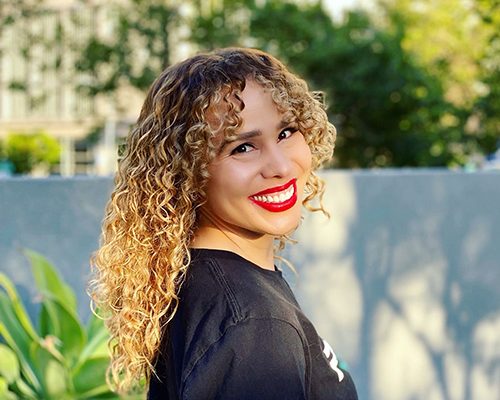Crunchbase Spotlight is a series that celebrates diversity and inclusion in entrepreneurship, venture capital, and tech by profiling people of color, women, and individuals who identify as LGBTQ.


Do you remember the first time you encountered racism?
Mandela Schumacher-Hodge Dixon, the founder and CEO of Founder Gym, does–vividly–even though she was only 7 years old when it happened.
A group of kids were competing in an arm wrestling competition and she wanted to join in. However, one of the young boys, who happened to be white, uttered a sentence that she would never forget: “I don’t play with black people.”
For Schumacher-Hodge Dixon, that was a defining moment in her life: “I remember being very hurt. It was the first time I had ever been rejected and I didn’t understand why.” She shared.
While that was an unforgettable moment, she didn’t allow it to define her as a person. What did define her, however, was an unshakable drive to find purpose.
To understand where her drive came from and how she got to where she is today, we have to go back to where it all started.
From Hollywood To The Steel City
Schumacher-Hodge Dixon was born in Hollywood, but grew up in Pittsburgh. A city (and state) that at the time wasn’t exactly high on the diversity meter.
“Growing up there it was very black and white. There wasn’t very much representation of diversity in terms of race or ethnicity,” she explained.
Her parents, both civil rights attorneys and social justice advocates, were eager to make an impact in a community where there was obvious inequality. They would soon find, however, that they were fighting more than one battle.
On one hand, Schumacher-Hodge Dixon’s parents were fighting for equality and justice in their community. On the other, they were a mixed-race couple battling the stigma that came with this type of relationship during a time of racial divide.
Despite their trials and tribulations, their experience and tutelage helped Schumacher-Hodge Dixon fully grasp who she was as a multiracial person.
“My father is black and my mother is white, so my multiracial identity really shaped how I understand race and its effect on not only how you see yourself but how others see and treat you,” she said. “My parents didn’t raise me to see hierarchies of people based on social constructs. I see the humanity, love and power in everyone.“
That sense of self-awareness and perspective was heavily influenced by her upbringing. When empathy, justice, and equity are normal ways of thinking and behaving in your household, as Schumacher-Hodge Dixon put it, you don’t know anything else.
“That shaped me incredibly. Whenever I did come into contact with prejudice or an ‘ism,’ (racism, sexism, etc.) it was blatantly wrong to me,” she said.
Those qualities would become foundational pillars that would play key roles throughout her life.
Coming Home
As a student at North Carolina State University, Schumacher-Hodge Dixon was a standout athlete.
A member of the soccer team as a walk-on, she was one of two freshmen to start, was voted team captain, and would eventually earn a full scholarship.
Life was good until tragedy struck and her world came to a screeching halt when her father suddenly passed away.
“My whole life, my father had been my hero, my coach, my mentor. He was the person who always gave me purpose when I didn’t know what mine was. So for him to be suddenly gone, it was the first time I was faced with the question ‘Who are you?’” she reflected.
At that point in her life, Schumacher-Hodge Dixon didn’t know what she wanted to be beyond a student-athlete. She did know that a more diverse environment was needed in her life; more than what Pittsburgh and North Carolina could offer at the time.
So, she took a leap of faith and left NC State during her junior year. Her destination? Back to where her life literally began, Los Angeles.
“It was like a new beginning. Kind of like coming home. I was born in Los Angeles. That’s where my parents met,” she explained.
With little money, Schumacher-Hodge Dixon moved in with her parent’s friends, got a job as an office manager at a family law firm in Santa Monica, and eventually enrolled at Pepperdine University.
During her time at Pepperdine, she did three things that gave her a new perspective on life and a career after college:
- She participated in Pepperdine’s study abroad program and lived in Argentina for a semester.
- She mentored young men at Camp Kilpatrick, the youth detention center that the movie “Gridiron Gang,” featuring Dwayne “The Rock” Johnson, was based on.
- She volunteered at a day labor center where she helped the organization write its first grant, so it could get computers and educational materials to help immigrant workers learn the English language to improve their negotiation skills.
Contemplating her next move, she went to a nonprofit career fair to explore joining the Peace Corps.
As fate would have it, a Teach for America booth was right next to the Peace Corps booth. The more Schumacher-Hodge Dixon learned about the organization, the more she realized that she wanted to teach.
She took the opportunity with Teach for America and became a professional educator, even going back to school to get her masters degree in education.
Her career was off to the races; until the 2008 recession hit.
Launching Her First Company
The recession hit many people hard, including Schumacher-Hodge Dixon. She was laid off from her job and faced an all-too-familiar question: What next?
She decided to pursue a Ph.D. in education. A couple years later, her partner at the time was interested in starting a business and found an event, Startup Weekend, where budding entrepreneurs could pitch ideas and create a team to work on them.
Startup Weekend happened to be holding an event focused on the education space. Schumacher-Hodge Dixon, not surprisingly, had ideas about how to fix some of the problems in the education system.
In one weekend, she participated in her first startup competition, and won first place.
She officially launched her first company after the competition and entered the world of entrepreneurship, all while continuing to pursue a Ph.D., which she eventually dropped to work on the startup full time.
As with any startup, it wasn’t an easy road. Schumacher-Hodge Dixon found herself maxing out her credit cards, cashing out her teacher retirement account, and taking on side jobs to make extra cash to invest back into the company.
Eventually, the co-founders raised startup capital from Kapor Capital and 500 Startups and became the only Black founders admitted into Imagine K12 that summer (Imagine K12 has since been folded into Y Combinator). This was 2012, and at the time, there weren’t many Black founders, especially Black women founders, raising venture capital in Silicon Valley. Schumacher-Hodge Dixon was amongst the first to navigate these unfamiliar waters.
Helping Underrepresented Founders Scale Tech Startups
After shutting down her first startup, Schumacher-Hodge Dixon went on to spend time working at Startup Weekend before it was acquired by Techstars, and then joined Kapor Capital.
It was while at Kapor Capital that a new idea started to emerge.
As Kapor Capital’s first director of portfolio services, Schumacher-Hodge Dixon was in a unique position to interact with the firm’s portfolio companies. It was through these interactions that she noticed something.
“Because they [Kapor Capital] invest in such a diverse group of founders, I was able to see differences. It was like a petri dish: I was able to see how white male founders act; how Asian founders act; how Black female founders act. I got to see their experiences and started noticing gaps–behavior gaps, network gaps, knowledge gaps,” she said. “I felt like I was positioned to help fix that.”
In 2017, she put her life lessons and education to work, and Founder Gym was born.
Founder Gym is an online program that teaches underrepresented founders how to raise money to scale their tech startups and navigate the unwritten rules of the startup ecosystem correctly.
As Schumacher-Hodge Dixon explains it, “Founder Gym is a manifestation of all of my lived experiences.”
From starting a company to getting a crash course in venture capital, Schumacher-Hodge Dixon has created her own classroom from which to share her knowledge and experience to help underrepresented founders build thriving businesses.
In just a few years, Founder Gym has helped over 440 founders raise over $55 million in funding.
Always Forward, Never Backward
From racism to the hardships of running a company as a first-time founder, there were several things that could’ve derailed Schumacher-Hodge Dixon’s journey.
Whether it’s in sports or business, she’s an example of how being resilient and determined to find purpose can put you on a path of creating a significant impact in the world.






